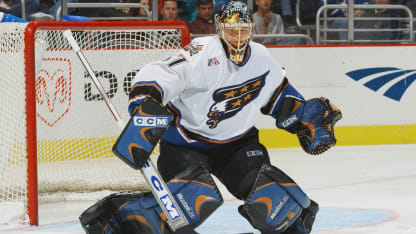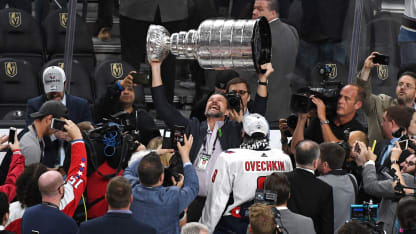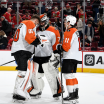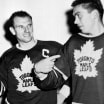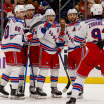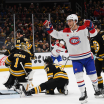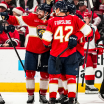In NHL.com's Q&A feature called "Sitting Down with …" we talk to key figures in the game, gaining insight into their lives on and off the ice. In this special offseason edition, we feature Washington Capitals development coach and former goalie Olie Kolzig.
ARLINGTON, Va. -- Olie Kolzig’s old and current job intersected for a busy but enjoyable few days during the Washington Capitals Alumni Association 2023 Alumni Weekend last week.
The 53-year-old former goalie watched Washington’s 4-3 preseason victory against the Detroit Red Wings in a suite with more than 20 alumni members, including old teammates such as Peter Bondra, Dmitri Khristich and Ken Klee, at Capital One Arena on Thursday night. On Friday morning, Kolzig was at MedStar Capitals IcePlex to watch a training camp practice in his role as a Capitals development coach, and later that evening, the alumni hosted a Fantasy Camp on-ice clinic and a Stars & Spirits rooftop charity event benefitting the Capitals Alumni Community Fund.
Kolzig loved it all.
“It’s awesome,” Kolzig said. “It’s really something that started taking off just before COVID came (in 2020). Peter Bondra and the staff up in the front office have really taken the bull by the horns and tried to make it something that we can hopefully someday compete with St. Louis and Philly and Chicago. … Now we’ve got Braden Holtby, who we’re still trying to get to come. Mike Green was there, and Karl Alzner. So as more and more guys retire, the alumni are going to be bigger and bigger.”
Kolzig, who retired in 2009 after 17 NHL seasons (16 with Washington), holds the Capitals record for wins (301) and is tied for first in shutouts with Holtby (35). During his career, he won the Vezina Trophy as the best goalie in the NHL in 1999-2000, and the King Clancy Trophy, which is awarded annually to the NHL player who best exemplifies leadership qualities on and off the ice and has made a noteworthy humanitarian contribution in their community, in 2005-06.
Kolzig came the closest to winning the Stanley Cup as a player in 1998, when he helped the Capitals advanced to the Stanely Cup Final before they were swept by the Detroit Red Wings. However, after retirement he was hired by the Capitals as an associate goaltender coach in 2011, and seven years later finally got his name on the Cup.
In a Q&A with NHL.com, Kolzig discussed his career, seeing old friends, his memories of a young Alex Ovechkin, working with Capitals prospects, and more.
When the alumni see each other, do you go right back to telling the same stories from when you were playing?
“Oh yeah. We reminisce, obviously, about the time we went to the [1998 Stanley Cup Final] and all the guys that we played with that are coaching now. We talk about our kids and all of a sudden, you know, when we were playing together, I didn’t have kids and Kenny Klee had very young kids, and now my girls are in college and his kids are done with college. It’s just crazy how life changes, and it’s just great to catch up and see how everybody is doing.”
What is your fondest memory from your playing career? Is it that run to the 1998 Stanley Cup Final?
“Yeah, you’d have to say that’s what it was on the ice. The year I won the King Clancy is probably the proudest moment for me. My dad had just passed away, and to be given that award for leadership on and off the ice … it’s more important to do the stuff away from the rink because we can have such an influence on people, and to be able to help less fortunate (people), as athletes we have a platform, and we can make such a difference. So for me, my proudest moment was winning that award. I know my dad would have been proud, and my mom was there.”
The Capitals ran into an all-time team in the Cup Final in the Red Wings, who won back-to-back championships (also 1997). As disappointing as that was at the time, can you appreciate what you were able to accomplish that season?
“No question. We surprised a lot of people. That was my coming-out season. When we went into the series against Detroit, because they were the defending champs and they had a special team, I think there was just a tad of disbelief that we could beat them, and I think that was the difference. Had we won Game 2 (a 5-4 overtime loss), which we were in control, I think the series would’ve been different because I think our mindset would’ve changed and we would’ve been coming home tied instead of down 2-0. But again, they had a great team. Then you realize how hard it is to get there because the next year we were like: ‘We’re even a better ream this year. We’ll try to find a way to get back into it and get there again.’ And I don’t think we got out of the first round for the next 10 years. So it’s a hard thing to do.”
Did getting your name on the Cup after the Capitals won it in 2018 take away some of the sting?
“Oh yeah. For me, it wasn’t a matter of getting my name on the Cup. That’s obviously special and that’s always going to be there, but just being part of a team that wins the Cup, regardless of if you’re management, if you’re in player development, coaches, everybody has a hand in it. Ultimately the players are the ones who perform, but there’s a lot of us that get the guys ready. For me personally, there were six guys in the lineup I had worked with the year before in Hershey (of the American Hockey League). So that’s gratifying. It would’ve been awesome to win it as a player, but it was just as satisfying winning in 2018 as a player development guy.”
